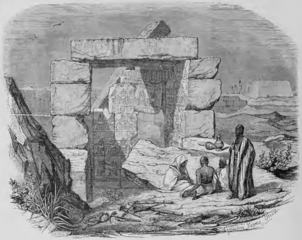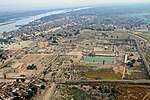Karnak king list
The Karnak king list, a list of early Egyptian kings engraved in stone, was located in the southwest corner of the Festival Hall of Thutmose III, in the middle of the Precinct of Amun-Re, in the Karnak Temple Complex, in modern Luxor, Egypt. Composed during the reign of Thutmose III, it listed sixty-one kings beginning with Sneferu from Egypt's Old Kingdom. Only the names of thirty-nine kings are still legible, and one is not written in a cartouche (a border used normally to surround the name of a king).

It is not a complete list of the Egyptian Pharaohs, as other kings are known from other ancient lists, but this list is valuable as it contains the names of kings of the First and Second Intermediate Periods, which are omitted in most other king lists.
It was first described by James Burton in 1825.[1] In 1843, a German expedition directed by egyptologist Karl Richard Lepsius was traveling up the River Nile to Karnak. A French adventurer, Émile Prisse d'Avennes, dismantled and "stole" the blocks containing the king list one night in order to secure it for France, and sent it home.[2][3] Severely damaged, it is now on display at the Louvre[4] in Paris.
Drawing of the list

Description of the list
The list features the name of the Pharaoh followed by the actual one inscribed on the list. The list comprises three sections and is divided at the center. The numbering follows Lepsius,[5] counting from the sides, toward the center.
| Left side | Right side | ||
|---|---|---|---|
| Top Row | |||
| Pharaoh | Inscribed name | Pharaoh | Inscribed name |
| 1. Unknown | Nefer-ka-re | 32. Senusret III | Kha-ka-re |
| 2. Sneferu | S-neferu | 33. Sobekhotep IV | Kha-nefer-re |
| 3. Sahure | Sahu-re | 34. Neferhotep I | Kha-sekhem-re |
| 4. Nyuserre Ini | Ini | 35. Destroyed | destroyed |
| 5. Djedkare Isesi | Isesi | 36. Sobekhotep I | Sekhem-re-khu-tawy |
| 6. Destroyed | destroyed | 37. Amenemhet VI | S-ankh-ib-re |
| 7. Destroyed | destroyed | 38. Nebiryraw I | Se-wadj-en-re |
| 8. Djehuti | Sekhem-re-semen-tawy | 39. Unknown | ...kau(re) |
| Second Row | |||
| Pharaoh | Inscribed name | Pharaoh | Inscribed name |
| 9. Destroyed | destroyed | 40. Destroyed | destroyed |
| 10. Intef II? | Intef | 41. Neferhotep II | Mer-sekhem-re |
| 11. Intef I? | In... | 42. Sobekhotep VII | Mer-kau-re |
| 12. Mentuhotep I? | Men... | 43. Sobekhotep VIII? | Se-user-tawy |
| 13. Intef the Elder? | Intef | 44. Unknown | ...re |
| 14. Unknown | Teti | 45. Unknown | Senefer..re |
| 15. Unknown | Pepi | 46. Khahotepre Sobekhotep | Kha-hotep-re |
| 16. Merenre Nemtyemsaf I? | Mer-en-re | 47. Sobekhotep II | Kha-ankh-re |
| Third Row | |||
| Pharaoh | Inscribed name | Pharaoh | Inscribed name |
| 17. Amenemhat I | Se-hotep-ib-re | 48. Rahotep | (Sekhem)re Wahkhaure |
| 18. Amenemhat II | Nebu-ka-re | 49. Sewahenre Senebmiu | Se-wah-en-re |
| 19. Destroyed | destroyed | 50. Merhotepre Sobekhotep | Mer-hotep-re |
| 20. Destroyed | destroyed | 51. Wegaf | Khu-tawi-re |
| 21. Amenemhat IV | Maat-khe-ru-re | 52. Destroyed | destroyed |
| 22. Sobekneferu | Sobek-neferu | 53. Destroyed | destroyed |
| 23. Sehetepkare Intef? | Intef | 54. Sobekemsaf I | Sekhem-re-wadj-khau |
| Bottom Row | |||
| Pharaoh | Inscribed name | Pharaoh | Inscribed name |
| 24. Senusret I | Kheper-ka-re | 55. Unknown | ...re |
| 25. Seqenenre Tao | Se-qen-en-re | 56. Senusret IV? | Senefer..re |
| 26. Senakhtenre Ahmose | Se-nakht-en-re | 57. Unknown | Sewadj..re |
| 27. Bebiankh | Se-user-en-re | 58. Unknown | Sekhem..re |
| 28. Nubkheperre Intef | Nub-kheper-re | 59. Destroyed | destroyed |
| 29. Mentuhotep II | Neb-hepet-re | 60. Destroyed | destroyed |
| 30. Mentuhotep III | Se-nefer-ka-re | 61. Destroyed | destroyed |
| 31. Destroyed | destroyed | ||
Gallery
See also
- Abydos king list
- Manetho king list
- Palermo Stone
- Saqqara Tablet
- Turin King List or Turin Papyrus
- Medinet Habu king list
Notes
- Burton, James: "Excerpta Hieroglypica", Plate Ia, Cairo, 1825
- "L'Illustration, Journal Universel", Vol. VII, p 244-245, Paris 1846
- Monderson, Frederick. "Temple of Karnak: The Majestic Architecture of Ancient Kemet" p. 58
- Chapelle des ancêtres in the Sully wing, Rez-de-chaussée, Room 12, Catalogue number E13481bis
- Abhandlungen der Königlichen Preußischen Akademie der Wissenschaften zu Berlin 1852 (1853) p.455
External links
| Wikimedia Commons has media related to Karnak king list. |
- Lepsius drawing from APAW 1852 from Berlin-Brandenburgische Akademie der Wissenschaften
- Karnak king list with complete hieroglyphics, sources and pictures
